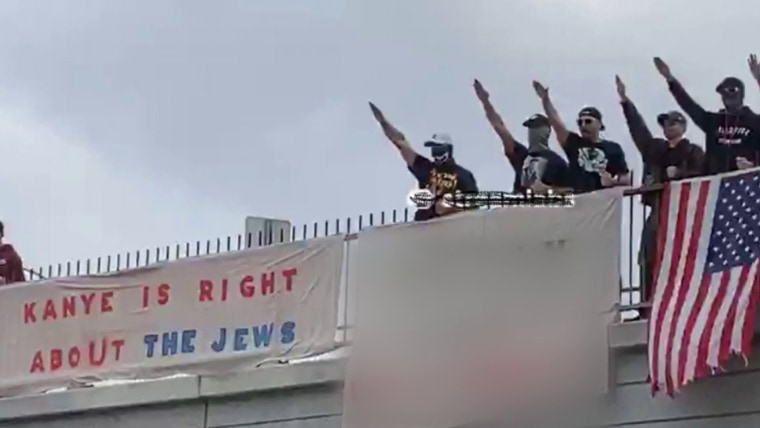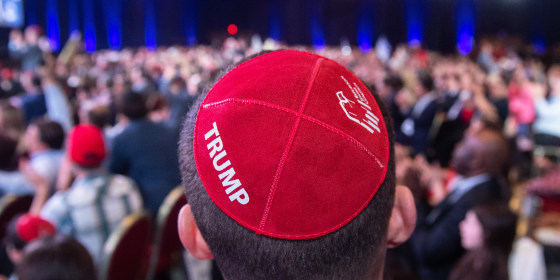With the midterm elections bearing down upon the country, Republicans suddenly can’t seem to stop talking about, admonishing and even threatening Jews.
This places Jewish Republicans in a bind: Will they side with their party and its deep roster of candidates, who are trafficking in subtle and unsubtle forms of antisemitism? Or will they speak out against bigotry and adhere to a more traditional Jewish-American ethos of placing the safety of the entire community first and foremost?
As recently as five years ago, any expression of anti-semitism from any figure anywhere on the political spectrum would have been explicitly and rapidly condemned by nearly the entire Jewish-American community.
Right now, it looks like they’re taking the low road of putting up with antisemitism out of partisan commitment, and neglecting to consider how dangerous of a wager they’re making.
This choice confronts them almost daily. A few days back, Rebbie Mastriano, the wife of Republican Senate candidate Doug Mastriano of Pennsylvania, commented that she and her husband “probably love Israel more than a lot of Jews do.” This past Sunday in Nevada, Jewish Insider broke the story that a former paid staff member of Nevada Republican Senate candidate Adam Laxalt was tweeting about Judaism being a cult. Mark Finchem, a Republican candidate for secretary of state in Arizona, drones on about George Soros and other Jews he considers unpatriotic. The Jewish Telegraphic Agency recently reported that a Texas GOP congressional candidate wrote a 2020 novel about Anne Frank that explores the possibility that the beloved Holocaust martyr was Christ-curious.
Follow our 2022 midterm elections live blog at msnbc.com/midterms for the latest results, news and expert analysis in real time.
This torrent of conservative antisemitism raises a question: Why now? First and foremost, there is the polarizing influence of Donald Trump. Among his dark talents is his unique ability to: (1) sniff out some type of irrational rage or prejudice shared by a large group of (mostly white) people, (2) repackage and amplify that rage, and then (3) hand the toxic byproduct back to the aggrieved parties to dispense with as they please. Trump complains periodically about disloyal Jews who don't appreciate him. These laments function as a force multiplier of antisemitic currents that have always existed within the GOP, and the country at large.
Second, one third of the Republican Party’s base is composed of white evangelical Protestants. Since the Reagan revolution, these conservative Christians have been a mainstay of the GOP. Yet with the election of Trump in 2016, they — including some of their more fringe elements — have not only become emboldened but increasingly scrutinized and platformed in the whirligig of digital media.

Evangelical theology takes more than a passing interest in Jews as both objects of conversion and as central actors in the End Time Saga, in which Israel emerges as the ultimate arena of Christian salvation. These Christians often express disappointment, even outrage, that Jewish Americans don’t love Israel — by which they mean its increasingly religious-nationalist ruling coalitions — as much as they do.
Finally, while more than 70% of Jewish Americans solidly support Democrats, there may be a slight and ongoing drift of Jewish voters to the GOP. Although by no means the “Jexodus” that the Trump administration talked up, the support has been steady. The recent rise of a more vocal, and ideologically coherent Republican Jewish electoral bloc has had an unforeseen effect. Republican Jews criticize non-Republican Jews, as is their right. Yet in doing so they may be morally licensing non-Jewish extremists to pile on as well.
So what do Republican-identified Jews do when confronted with the kind of anti-Semitic provocations mentioned above? Permit me to point out that as recently as five years ago, any expression of antisemitism from any figure anywhere on the political spectrum would have been explicitly and rapidly condemned by nearly the entire Jewish American community. And no, I don’t think I am gripped by some nostalgic delusion of tribal consensus.
Jews famously bicker among themselves about all sorts of things. But when public figures unleashed anti-Jewish allusions, slights, dog whistles and “but-some-of-my-best-friends-are-Jewish” banter, official (and nonofficial) representatives of the community made their displeasure known. There were occasional exceptions, but when these lines were crossed, nearly every Jewish organization and major political figure transformed into a defender of the faith.
What is remarkable is how this inner-Jewish unity is being torn asunder.
What is remarkable is how this inner-Jewish unity is being torn asunder. In the face of highly publicized antisemitic comments, there has been either silence or pushback among Jewish Republicans. In Pennsylvania, right-wing Jewish groups have said nothing in response to antisemitic provocations by the Mastriano campaign. In Arizona,“Jewish Voices for Kari Lake” has been voiceless in light of revelations about her links to white supremacists. In the aftermath of dozens of anti-Jewish statements by political leaders, the Republican Jewish Coalition has not tweeted a word of condemnation. Two Jewish Republican members of Congress, Lee Zeldin of New York (currently running for governor and not averse to denouncing other forms of antisemitism) and David Kustoff of Tennessee, have expressed no thoughts on the issue.
Less frequent but no less remarkable are the occasional Jewish defenses of GOP Judeophobia. In response to the scandal in Nevada, a Jewish representative of the Laxalt campaign deflected by bringing up his opponent taking funds from a moderate pro-Israel organization.
A few days back, the FBI announced the existence of “credible information of a broad threat” against synagogues in New Jersey. The provenance of the threat remains unknown. Violence against Jews, of course, can come from the left, the right, in between and beyond. Yet the recent history in the United States suggests that white supremacists are currently the most pressing and deadly threat.
My counsel to Jewish Republicans, is that before chopping wood for patently antisemitic Republicans, before invoking “The Squad,” before donning a lib-owning T-Shirt that reads “Good Jewish Character, Right Here!” they ought to reflect upon a crucial — dare I say, existential — question: Will right-wing extremists care to distinguish Jewish Republicans from Jewish Democrats if and when they come to power?

